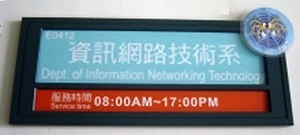


The department of Information and Networking Technology was found in 2002. It started with 1 class of 2-year full-time college program. In 2004, it was approved by the Ministry of Education (MOE) for opening 1 class of 4-year full-time college program. In 2006, it was approved for opening 1 class of 4-year college night program. In order to improve the curriculum performance, the 2-year program was called off in 2008, and the night program will discontinue in 2012 as well. Currently, there are 2 full-time and 1 night classes for each academic year. Totally, there are 12 classes and about 557 students. With the remarkable curriculum performance and our faculty and students' efforts, we were awarded the first rank as the result of MOE professional evaluation in 2007. In addition to our alumni's outstanding performance, our department has built up its reputation and performance of high employment rate.
The information networks are a shining business in the 21st century. There is a huge demand for skilled personnel, on both domestic and foreign markets. The Department of Information and Networking Technology aims for training students to be qualified IT professionals, making them keep pace with the world-wide information networks for their career developments. To achieve this goal, the curriculum of the department is featured as follows.

The professional courses are divided into three categories: communication and networking technologies, system analysis and application development, and system administration. These three categories are expected to train students as network engineers, programmers, and system administrators respectively. The above three categories are also the categories of high-demanded jobs in current industry.
The syllabi of the three course categories are mixed with the material that are authoritative and professional in the specific international certification fields. The courses for the communication and networking technologies are mainly instructed with the CISCO CCNA certification program; the courses for the system analysis and application developments are guided with the Oracle SCJP certification program; and the courses for the system administration are taught with the Microsoft MCTS and open-source LPI programs. The students will gain their international professional certificates and high job competence after graduate.
The department provides intensive training for core professional skills. For instance, CCNA training courses take four consecutive semesters; programming courses three semesters; system administration three semesters; database management and application three semesters. By expanding the training hours, students can be trained very well. The professional curriculum we provide is easy for you to get through if you want.
Our full-time teachers have detailed industrial background. They had been employed by Mobitai Communications, IBM, Institute For Information Industry, Chunghwa Telecom Laboratories, Vanguard International Semiconductor Corporation, etc. Therefore, the lessons are connected with practical cases and latest industrial trends. Meanwhile, there are abundant professional instruments for core courses, for instance, CISCO routers, Fluke network equipment, etc. Students can grow their practical skills from experiments.